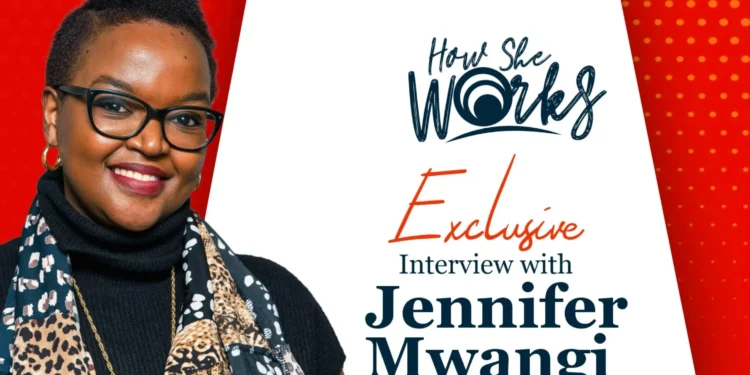How She Works is a joint editorial project from TechSoma.me and FindExpertsME. Each feature looks beyond a résumé to uncover the daily disciplines, pivotal choices, and personal philosophies that power extraordinary women. The goal is simple: give readers a clear, human playbook they can adapt to their own careers, free of jargon and full of candid insight.
Purpose Over Process
Jennifer Mwangi is a Senior Healthcare Transformation Specialist, Digital Health Leader, and Cultural-Competence Researcher who has built her career around one deceptively simple question: Is the care actually better? This question once saved a programme that appeared successful, with shorter waiting times, faster discharges, yet patient complaints were rising. Jennifer insisted on gathering qualitative feedback, reframed the metrics, and embedded patient-defined measures of “better” into every future engagement. Today, that question is her starting point for every project.
Process, Culture, and Data as Equal Partners
Her first improvement project in the NHS was a maternity transformation programme designed to reduce variation and improve continuity of care. In a co-design session, a mother shared that she had seen five different professionals during her pregnancy and felt like a “case,” not a person. Jennifer and her team used process mapping, cultural insight, and outcome data to redesign the care model around Continuity of Carer principles. Within months, maternal satisfaction scores rose, missed appointments fell, and postnatal engagement improved, particularly among women from ethnic minority groups.
Anchoring the Day
Before Slack pings and dashboards, Jennifer begins with five minutes of silence and one handwritten line: What is the single outcome I must achieve today? She reviews lessons from the previous day before opening her email. This ritual sets her focus and allows her to respond rather than react.
Culture as Core Infrastructure
When rolling out the CORE20PLUS5 approach, Jennifer discovered that cultural disconnect, not resourcing, was stalling progress. System priorities were not resonating with the lived experiences of Black and South Asian women. She reframed the programme with culturally resonant storytelling, brought local advocates into the design process, and built trust before scaling interventions. Participation turned into co-ownership, demonstrating that culture is not a soft add-on but the foundation for sustainable health equity.
Data With a Pulse
Jennifer simplifies overwhelming KPI sheets by narrowing focus to three measures: one for patient outcomes, one for workforce wellbeing, and one for financial or operational sustainability. These become a balanced scorecard that drives behaviour across teams. She pairs numbers with regular qualitative insight so that data becomes a story that motivates action rather than a static report.
Leading Through Crisis
During the height of the COVID-19 elective backlog, Jennifer led the rollout of remote consultation platforms across multiple trusts. A senior surgical team initially pushed back, citing concerns about safety and exclusion. Jennifer held onto real-time patient access data and equality impact assessments, piloted low-risk pathways first, and gathered live patient feedback. Within weeks, clinicians moved from scepticism to advocacy.
Quietly Assertive, Culturally Fluent Leadership
In tense negotiations between clinicians and technologists, Jennifer anchors everyone in a single question: What would success look like for patients and staff? She is known for translating data into meaning and technology into clinical impact, bringing empathy into decision spaces where urgency might otherwise override consensus.
A PhD With Global Implications
Her PhD research on cultural competence was born out of repeated encounters with inequity hidden in plain sight. Traditional diversity models were not closing gaps in outcomes. Jennifer is building a practical, measurable framework to embed cultural competence in system design from boardroom decisions to bedside delivery.
Mentorship as Shared Identity
Jennifer’s tiered mentorship ladder, peer, cross-functional, and reverse mentoring boosted engagement scores by over 20 points. It thrives because it was co-created with staff and embedded into development plans. “Sustainable mentorship is less about structure and more about shared identity,” she says.
A Cross-Border Perspective
Dubai’s diverse healthcare ecosystem excites Jennifer because it blends global standards with local complexity. She believes lessons from NHS governance—particularly clinician-led decision-making can ensure that rapid growth in the UAE results in innovation that lasts.
Lessons from Missteps
When an e-rostering rollout went sideways, Jennifer paused the programme, admitted that deadlines had been prioritised over dialogue, and co-designed a new approach with clinicians. Trust was rebuilt, satisfaction improved, and rota fill rates climbed. The experience reinforced that transformation must respect professional identity as much as operational logic.
The Writing That Sparks Debate
Jennifer’s LinkedIn essays often begin as notebook scribbles. She lets ideas mature, pressure-tests them with trusted peers, and only publishes if hitting “post” makes her slightly nervous about her measure of authenticity.
Legacy in a Single Line
When asked how she hopes to be remembered, Jennifer says: She led with empathy and clarity, inspiring teams to embrace difference as a strength and transform care with courage and cultural insight.













